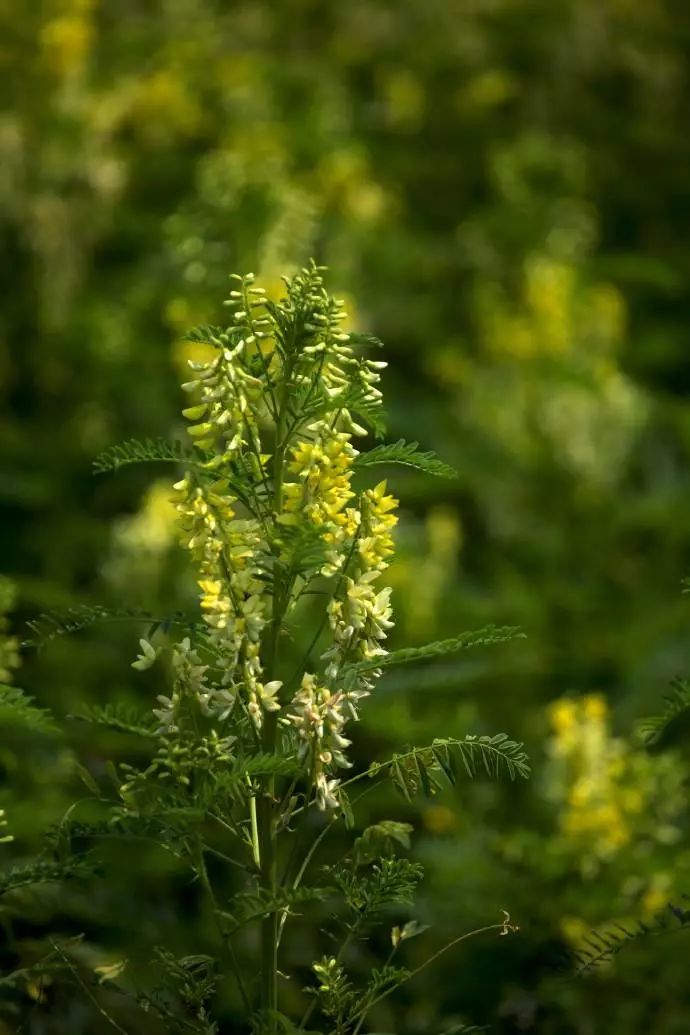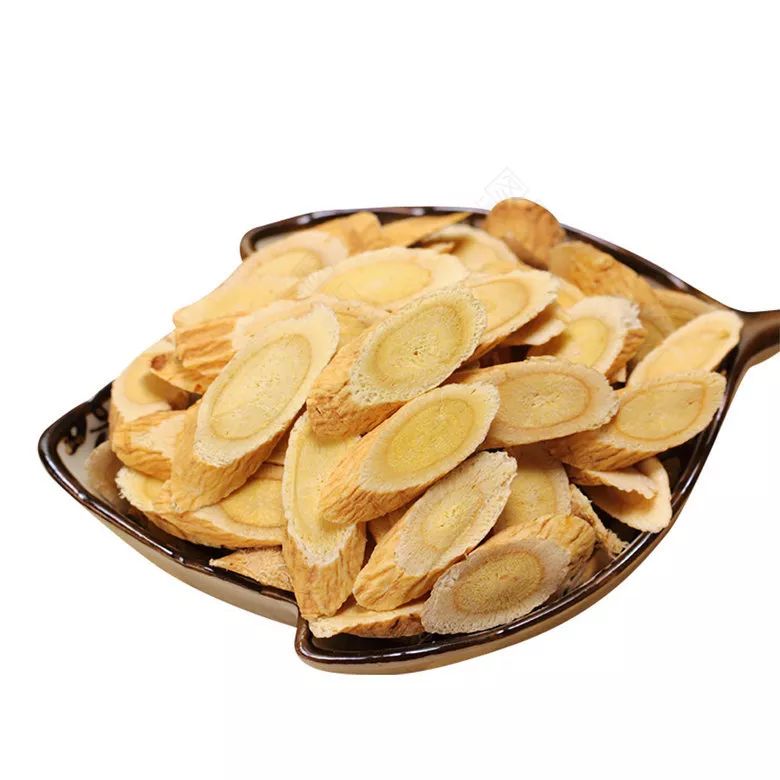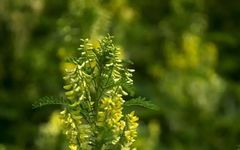Follow 【Wang Fang Talks TCM】, your local TCM expert
A Discussion on Astragalus (Huang Qi)
Astragalus, also known as Huang Qi (黄芪), is a key herb for tonifying Qi, first recorded in the Shen Nong Ben Cao Jing. In ancient texts, it was written as “Huang Qi”. Li Shizhen explained in the Ben Cao Gang Mu that “Qi (耆) means long (长 zhǎng). Huang Qi is yellow in color and is the foremost among tonifying herbs, hence its name.”

Astragalus is a perennial herb, growing 50-100 cm tall, found in regions such as Inner Mongolia, Shanxi, Gansu, and Heilongjiang. It has been used medicinally for over 2000 years. Due to extensive harvesting, wild Astragalus has sharply declined in recent years and is now classified as a nationally protected species, making it a vulnerable plant.
Astragalus is one of the most commonly used Chinese herbs. Many people know that it has a Qi-tonifying effect, which is why it is available in supermarkets as an ingredient for stewing chicken or duck. However, the concept of “Qi” in TCM is broad. What are the specific characteristics of Astragalus in tonifying Qi? How does it differ from Ginseng in this regard? What should families be aware of when using Astragalus?

1. Properties and Channels
Astragalus is sweet, slightly warm, and enters the Lung (肺) and Spleen (脾) meridians.
2. Functions
Tonifies Qi and raises Yang, stabilizes the exterior and stops sweating, expels toxins and promotes tissue regeneration, diuretic and reduces swelling.
3. Clinical Applications
1. Tonifies Qi and raises Yang
Astragalus can be used for symptoms of Spleen and Lung Qi deficiency, such as fatigue, shortness of breath, diarrhea, prolapse of the rectum, and organ prolapse. It is often combined with Dang Shen (党参), Sheng Ma (升麻), Chai Hu (柴胡), and Zhi Gan Cao (炙甘草). A representative formula is Buzhong Yiqi Tang (补中益气汤). There are also commercial preparations like Buzhong Yiqi Wan (补中益气丸).
2. Tonifies Qi, stabilizes the exterior, and stops sweating
Astragalus is often used for spontaneous sweating due to Qi deficiency, susceptibility to colds, and allergic rhinitis. For example, when combined with Bai Zhu (白术) and Fang Feng (防风), it forms Yupingfeng San (玉屏风散), which tonifies Qi, stabilizes the exterior, and stops sweating. There are commercial preparations like Yupingfeng Oral Liquid, Yupingfeng Granules, and Yupingfeng Capsules, which are effective with prolonged use.
3. Tonifies Qi, strengthens the Spleen, diuretic and reduces swelling
Astragalus can be used for various types of edema due to Qi deficiency and Spleen weakness with water retention. For example, in cases of acute and chronic nephritis with edema, it is often combined with Fang Ji (防己), Fu Ling (茯苓), and Bai Zhu (白术), as in the formula Fangji Huangqi Tang (防己黄芪汤).
Astragalus can also be used for obesity due to Qi deficiency and dampness obstruction, which is often referred to as “false obesity”.
4. Tonifies Qi, strengthens the Spleen, expels toxins and promotes tissue regeneration
Astragalus is used for conditions of Yang deficiency where sores do not heal or are slow to heal. It is often combined with Dang Shen, Rou Gui (肉桂), Dang Gui (当归), Jin Hua (银花), Zao Ci (皂刺), and Di Ding (地丁), which have the special ability to expel toxins and promote tissue regeneration.
5. Tonifies Qi to promote blood circulation
“Qi is the commander of blood”; when Qi flows, blood flows. Therefore, tonifying Qi can promote blood circulation. Astragalus can be widely used for Qi deficiency and blood stasis conditions. For example, it is indicated for stroke with Qi deficiency and blood stasis, presenting with hemiplegia, facial drooping, slurred speech, and drooling. The treatment is Buyang Huanwu Tang (补阳还五汤), composed of Astragalus, Chi Shao (赤芍), Chuan Xiong (川芎), Dang Gui, Di Long (地龙), Tao Ren (桃仁), and Hong Hua (红花). In this formula, Astragalus is used in a large amount to tonify Qi, combined with blood-activating herbs, to enhance Qi, invigorate blood, and open the meridians. It is commonly used for treating sequelae of stroke, coronary heart disease, and post-polio syndrome.
Another example is for treating Wei syndrome due to deficiency of Ying and Wei, presenting with numbness or pain in the limbs, or sweating and aversion to wind. The treatment is Huangqi Guizhi Wuwu Tang (黄芪桂枝五物汤), composed of Astragalus, Gui Zhi (桂枝), Shao Yao (芍药), Sheng Jiang (生姜), and Da Zao (大枣). This formula can tonify Qi, warm the meridians, and harmonize Ying and Wei. It can also be used for post-stroke conditions, hemiplegia, or weakness in limbs, or post-partum and post-menstrual pain. I often use this formula with Ge Gen (葛根) to treat cervical spondylosis causing finger numbness, which is also effective.
4. Dosage and Administration
Astragalus can be used raw or roasted. Generally, roasted Astragalus is used for tonifying Qi and strengthening the Spleen, while raw Astragalus is used for stabilizing the exterior, expelling toxins, and promoting diuresis.
The usual dosage of Astragalus is 15-30 grams. Depending on the condition, larger doses can be used, ranging from 60-250 grams. In ancient formulas, for treating “Crane Knee Wind” (膝关节肿大疼痛), the formula Si Shen Jian (四神煎) includes Astragalus at a dosage of 250 grams. Many later physicians have verified its effectiveness. I have also used a larger dose of raw Astragalus to successfully treat a patient with a liver abscess that would not heal post-surgery, where Western medicine had no solution.
Astragalus can be taken as a decoction, or made into patent medicines or injections, such as Astragalus tablets, Astragalus oral liquid, Astragalus essence oral liquid, and Astragalus injection, as well as compound preparations made with other herbs, such as Huangqi Shengmai Yin (黄芪生脉饮), Yupingfeng Oral Liquid, Buzhong Yiqi Wan, and Shiquan Dabu Wan (十全大补丸).
Astragalus can be used both internally and externally. According to the Old Book of Tang: Records of Medical Techniques, the famous physician Xu Yinzong from the Sui and Tang dynasties treated the empress dowager Liu, who had a stroke and could not speak, with steam inhalation using Astragalus and Fang Feng. After several hours of inhalation, she was able to speak again and eventually recovered after further treatment.
Nowadays, the method of medicinal steaming is also very popular, and combining internal and external treatments often enhances efficacy.
5. Health Benefits
Astragalus is also a commonly consumed natural health product. There is a saying among the people: “Drinking Astragalus soup regularly prevents disease and maintains health,” meaning that regularly using Astragalus in soups or as tea has good preventive health effects.
It is said that in the autumn of 1920, Hu Shi, after taking many Western medicines for an illness without recovery, was treated by the famous physician Lu Zhong’an, who used Astragalus as the main herb to cure him. He then developed a lifelong affinity for Astragalus. In his later years, feeling fatigued and weak, he often drank Astragalus tea before classes, which greatly increased his energy and allowed him to speak vigorously. He also shared this “secret” with those around him, benefiting many. Nowadays, many people also regularly drink Astragalus tea for health maintenance.
It is often said that Chinese herbs are difficult to consume, and while many have unpleasant tastes, Astragalus is an exception, being sweet. As a child, my family would occasionally indulge by buying a few grams of Astragalus and Dang Shen to stew with an old hen for the family. I remember that after eating the chicken, we children would fish out the Astragalus and Dang Shen to chew on, and they tasted quite good.
In daily life, Astragalus can be used in many ways besides making tea, such as stewing chicken or duck (it can also be combined with Dang Shen, Shan Yao (山药), and Goji Berries (枸杞)), with a dosage of 20-30 grams; it can also be used to cook porridge, make extracts, or infuse in alcohol.
6. Differences Between Astragalus and Ginseng
Astragalus and Ginseng are both commonly used Qi tonics. Ginseng is more focused on greatly tonifying the original Qi, often used for critical conditions such as Qi deficiency leading to collapse, shock, shortness of breath, and fatigue, and it can also tonify the Spleen and Lung, generate fluids, and calm the spirit. In contrast, while Astragalus’s Qi tonifying effect is not as strong as Ginseng’s, it is more suitable for general Qi deficiency symptoms, such as chronic fatigue, weak speech, and thin, weak pulse. It is particularly effective in raising Yang, stabilizing the exterior, expelling toxins, promoting tissue regeneration, and diuretic effects, which Ginseng does not provide.
7. Precautions for Use
Astragalus is mainly suitable for individuals with Qi deficiency and weakness, or those with low immune function due to prolonged illness. It should be used cautiously in cases of excess pathogenic factors, Qi stagnation, dampness obstruction, food stagnation, or early-stage or post-suppuration heat toxicity. It is also not recommended for those with Yin deficiency and Yang excess, or those who are prone to heat.
The dosage of Astragalus is not a case of “the more, the better”; it should be tailored to the individual and the condition. “Excess Qi can lead to fire”; excessive doses can easily cause heat symptoms, and tonifying Qi can also lead to Qi stagnation. These are important considerations!
Therefore, while Astragalus is beneficial, it should not be used indiscriminately. It is advisable to use it under the guidance of a TCM practitioner when necessary.
END

【Wang Fang Talks TCM】
Sharing the little bits of TCM life
Long press to follow: wangfangchat

